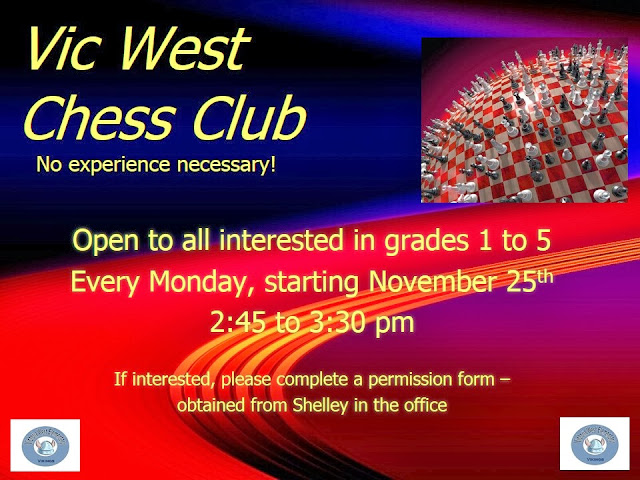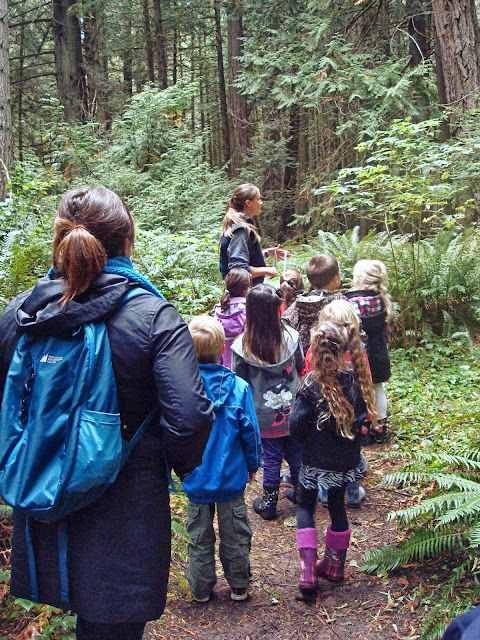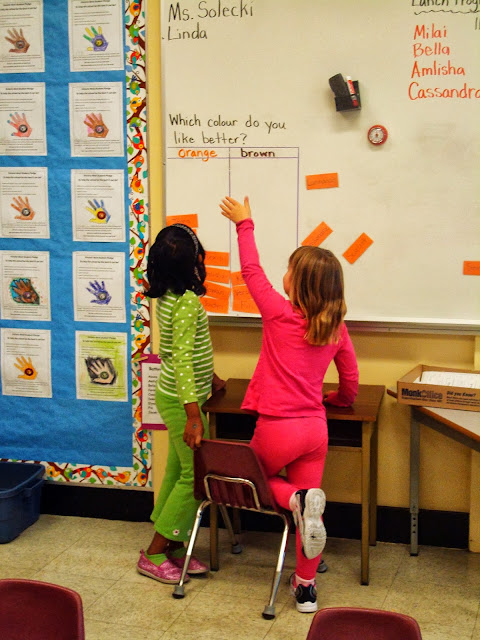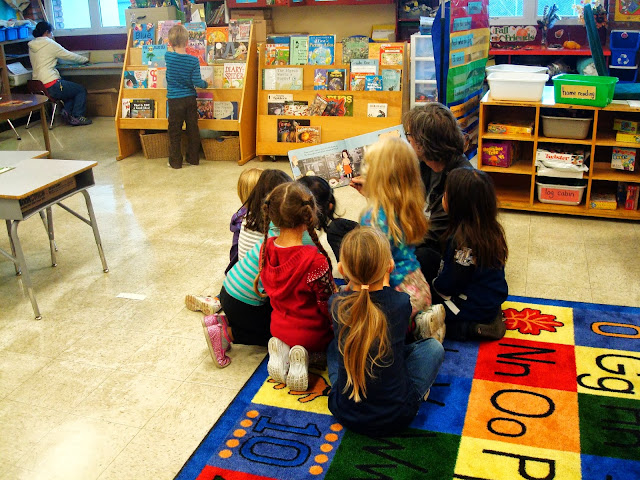ADHD Parent Info Day – November 19
An introduction session on the aspects of ADHD is coming up on November 19, 2013 at the SJ Willis school auditorium, 923 Topaz Avenue, from 8:30 a.m. to 2:30 p.m.
The event is co-sponsored by School District #61, Island Health, Children’s Health Foundation of Vancouver Island, Ministry of Children and Family Development, and the FORCE Society for Kid’s Mental Health.
Here is the day’s full agenda.
Parents interested in attending are asked to fill out this form. Deadline for applications is November 15.
Snapshots from Division 7
Ms. Solecki’s grade one class has been busy this fall both inside and outside the classroom. To showcase what her students have been up to, Ms. Solecki has kindly shared some fun snapshots of their learning adventures.
In the second week of October, the class took a trek through Francis King Regional Park to learn about squirrels. This Capital Regional District program, which was made possible in part through PAC funding, included a comedic puppet show starring a country squirrel curious about city life and a hike through the woods to imagine life as a critter of the forest. The world truly is a classroom!
Back at the school, Ms. Solecki’s students have been busy this fall putting thoughts and ideas to paper. Here they are creating entries in their journals.
Morning attendance is fun when students get to answer a question with their magnetic name when they arrive in the morning.
The wheels on the learning bus go A-B-C all through the town…
Class parents have been coming in for morning reading time. Moms and dads are welcome to stay after school drop-off to explore stories with the kids and share in the joy of reading together.
Since no fall would be complete without spiders, Ms. Solecki arranged for a scientist to come in and discuss spiders with her students. The exciting event included shaking “hands” with a live tarantula!
Thank you, Ms. Solecki, for sharing your snapshots with the PAC and for giving us a glimpse of the learning going on in Division 7!
What is Sensory Regulation?
You may have heard the term “self-regulation” or “sensory regulation” and wondered what it’s all about. Vic West Elementary Counsellor, Dianne Browne, kindly prepared the following information for the PAC to share with school parents.
SENSORY REGULATION SUMMARY
“Self-regulation” is a psychological concept based largely on the developmental research and teachings of York University professor Stuart Shanker. He refers to children needing to be able to effectively manage (regulate) their own environmental, physiological, emotional, cognitive and social stresses. A medical Sensory Processing Disorder (also referred to as Sensory Integration Disorder) effects how children manage their motor, language and emotional responses. These children will show extremely strong sensory preferences, intolerances and sensitivities. What this “looks like” in the school setting is seeing particular students reacting in one of three ways*:
- being over-responsive (becoming fearful or avoidant: unable to focus, follow directions, transition well, or remain still when the environment has too many distractions); under-responsive (seeking stimulation in the area of sensation that fails to register with them).
- having motor problems, including gross motor skills, with poor body awareness;
- being unable to recognize similarities and differences in sensory messages (low frustration tolerance).
Vic West parents can support their child who is suspected of having self-regulation difficulties by having the child evaluated by either a paediatrician or an occupational therapist who will determine what type of treatment would be most effective. To support all children regulate their stressors, the following Restitution (5 Needs) ideas would be very helpful:
- safety: talk with your child about how to keep the home a safe, caring, welcoming place (calm home environment)
- freedom: give your child choices about how to relax, make good choices, before going to busy places, ie being in the car, at the mall (physiological/body stressors)
- belonging: protect an introverted child from being pushed into large groups before he or she is prepared; provide boundaries when an extroverted child is excited about joining large groups, ie family gatherings (social stressors)
- power: “catch your child being good”, by modeling good thinking/planning strategies (cognitive stressors)
- fun: limit your child’s activities/day stressors that raise levels of excitement by including shared rewards in your parenting style ie. have your child experience fun, happy activities with you, such as day end bedtime stories (emotional stressors)
(*see Miller. L.J. 2006: “Sensational Kids”, New York: G.P. Putnam’s Sons Publ.)
Feel free to contact Dianne Browne, Vic West’s Behaviour Support Counsellor, for more ideas!
Vic West Elementary School Safety Plan
I think it’s safe to say, that when it comes to our children, safety is at the forefront of our minds. When our children head off to school each day, we want to know that the school is ensuring their safety while they are in the school’s care.
Vic West has a Safety Plan that is posted on the school’s website ( Vic West Elementary School ).
Below is the Safety Plan link, in case you haven’t seen it before.
Vic West Elementary School Safety Plan
Any questions or comments? Please send us an email at vicwestpac@gmail.com
Coats for Kids
Parent Education Night- A Restitution Overview with Sue MacTavish
Strategies for the anxious child
Parenting an anxious child has many challenges. From struggles with perfectionism and negative self-talk to leaving birthday parties early because it’s all just too exciting, the parents of an anxious child can be left feeling confused and overwhelmed.
The Vic West PAC believes one of the best things we can do is support one another and share ideas. So, one of our school parents put together this list of simple strategies that can be used at home with anxious children:
– Create a worry box. Have the child decorate their own small box that they can put their worries into and seal them away.
– Create a worry doll. Have the child use modelling clay to create a doll they can tell their worries to. Worry dolls are good listeners.
– Deep balloon breathing. Have the child imagine a balloon in their tummy. Ask them to fill it up by breathing in, then let it all out to empty the balloon.
– Counting. Counting to 10 or backwards from 5 can help steady emotions.
– Figure 8 tracing. Use the finger to trace a figure 8 on paper (or use the palm of the hand), breathing in on one loop and out on the other.
– Use a worry thermometer. Ask the child to point to how they feel on a scale of faces, from not worried at all to very worried. Example: http://anxietybc.com/sites/default/files/My_Fear_Thermometer.pdf
– Blow bubbles. Blow away the worries and watch them pop.
– Be a worry spy. Give the child a magnifying glass and ask them to find where the worry is in their body. Is it in their head? Their tummy? When you know where the worry is you can do something about it.
– Create a list of worry words. Give the child language to describe how they’re feeling. Just being able to say “I’m feeling anxious” can be a useful skill for any child.
– Be an anxiety example. Remind the child that everyone feels anxious sometimes. Even grown-ups! Demonstrate how you handle feeling anxious, ie. “I’m nervous about this business meeting today. I’m going to take some deep breaths to help me relax.” Or ask the child for advice on what you can do to relax.
– Encourage self-helping. Help the child help THEMSELVES. You can’t always be there, so it’s important for the child to know some techniques they can rely on when feeling anxious.
For information about anxiety, parents can visit the AnxietyBC website.
Lansdowne Appliances- A Great Big Thank You!
Appliances. Earlier this week, the school’s much-needed breakfast program shut
down because of a broken fridge. When Earl at Lansdowne Appliances learned
this, he had a replacement fridge at the school by day’s end. He couldn’t let
the students at his alma mater go without the most important meal of the day.
students have access to a nourishing breakfast!
YOU from the bottom of our hearts for being true community heroes.
Back to school!
As we all adjust to fresh routines for a new school year at Vic West Elementary, our diverse community of parents and guardians will have several opportunities to connect and contribute over the coming months. Here are a few bits of information from the Parent Advisory Council (PAC) for school families:
General PAC meetings are held on the second Wednesday of the month throughout the school year, and parents are welcomed with hot drinks and treats. Come be part of the conversation!











